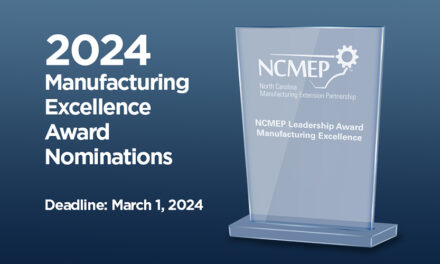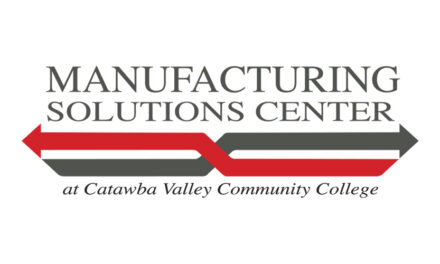A Closer Look at Two Companies and their Approaches to Leadership, Innovation and Market Diversification in the Early Stages of the COVID-19 Pandemic.
Introduction
The COVID-19 pandemic necessitated rapid shifts in business strategies and an ability to pivot to fill medical equipment needs of our country. Manufacturers across the country rose to the occasion and shifted production to fill needs that resulted from the supply chain disruptions caused by various shutdowns of key suppliers. Although some companies were able to grasp to maintain their operations, others continue to endure a massive struggle of remaining resilient through this challenging time. This blog provides an overview of two manufacturers in North Carolina who were not only involved in medical equipment / device production during the early stages of the pandemic, but were able to adapt quickly due to prior investments in technological innovations at their facilities. Roush Yates Manufacturing Solutions and Core Technology Molding Corporation were both involved in NC State Industry Expansion Solutions Department of Defense grant The North Carolina Defense Industry Diversification Initiative (NCDIDI), an Office of Economic Adjustment Industry Resilience program aimed at strategic market diversification and technology exploration for the defense supply chain in NC. Both of these companies shared with us some of their challenges and successes during the first six months of the COVID-19 pandemic.
Brief Company Backgrounds and Market Positioning Early in Pandemic
Roush Yates Manufacturing Solutions
Roush Yates Manufacturing Solutions (RYMS) was founded in 2008 as an expansion to Roush Yates Engines, the primary supplier of racing engines for Ford Motorsports in NASCAR. RYMS started off as a division of the company that was solely focused on high performance engine components, from R&D to production. Over the years, RYMS diversified their markets to include: medical, defense, industrial and aerospace. When the COVID-19 pandemic came to the U.S., RYMS’ diversification strategy and focus on maintaining a strong supply chain paid off. Designated an essential business through their work in defense contracting, they were allowed to remain open, and they made decisions prior to the U.S. outbreak to stock up on certain materials that had the potential to be impacted by supplier shortages / closures. Although they were able to keep their doors open, their business underwent changes based on the pandemic related demands of their customers (both existing and new). Motorsports went on hiatus, along with other sporting events, which impacted the Roush Yates Engine side of the business. With an influx in medical device orders and a rapid pivot to production of Personal Protective Equipment (PPE) products and ventilator parts, RYMS ramped up their production and took on additional staffing from the Roush Yates Engine division.
Core Technology Molding Corporation
Core Technology Molding Corporation (CTM) was founded in 2006 in Greensboro, North Carolina. CTM is a world class injection molding facility serving industries that include: medical devices, automotive, aerospace, gaming, biological pharmaceutical, and consumer goods, with customers located in over 150 countries. Prior to COVID-19, CTM had a strong footprint in the medical equipment space, with a dedicated clean room facility producing plastic components for syringes. Through strategic partnerships with their customers, and a substantial increase in demand related to vaccine production, they have expanded their clean room production space through acquisition of an adjacent space. As described below, their focus on technology as a means to improving quality and efficiency also led to a more agile and resilient business environment when additional safety protocols had to be put into place.
What key factors led to resilience through the pandemic?
Both companies indicated that leadership and organizational culture have been the key drivers of resilience so far in response to the pandemic. RYMS believes their racing heritage had an important part to play in the agility required to understand the changes in market conditions and pivot their operations to support the emerging needs of the healthcare sector. With a sharp decline in business in their racing division due to the pandemic, the company strategically shifted employees to the manufacturing side of the business and simultaneously pivoted to production of face shields and ventilators. The company’s position in manufacturing and serving the defense industry enabled them to be designated as essential business, allowing them to remain open throughout the pandemic. CTM was faced with a similar situation, their automotive side of the business had decreased, but they were taking advantage of emerging needs in the medical device sector and expanded their facility to match the demand.
Both of these companies also noted that without making investments in technology, they likely would not have fared as well during the pandemic. CTM made a significant investment in an ERP (enterprise resource planning) system prior to the COVID-19 pandemic. This system allowed them to monitor and control certain processes remotely, which was beneficial in the early stages of a mandatory lockdown across NC. It also increased visibility into their supply chain, which was highly valued among their larger OEM (Original Equipment Manufacturing) customers. RYMS similarly made investments prior to the pandemic that paid off, including a water jet machine. Prior to the pandemic, this piece of machinery was purchased to be used on special projects that required this particular cutting technology, but as orders increased drastically in the medical device sector, this machine was essential to fulfilling those demands. In addition, the company’s racing culture led them to constantly think about how a task could be performed better and faster. At RYMS, many of their CNC (computer numerical control) machines are fully automated, needing very little human interaction between jobs. This has helped stagger shifts, allowing for social distancing in the workplace during the pandemic. Both companies took advantage of audio and video conferencing tools to communicate safely, both with employees working remotely, as well as with clients. For some roles within the organization, working virtually proved to be very effective (e.g. IT, product design).
Lastly, both of these companies had sought quality management certifications that allowed them to diversify their markets and reduce barriers to participation in areas such as aerospace, defense, and medical. Diversification was one of the focus areas of the NCDIDI program, and is an important strategy to have in place in times of uncertainty. Core Technology Molding is a quality-centric organization with ISO 9001:2015, IATF 16949:2016, ISO 14001:2015 and a certified Class 10,000 (ISO 7) medical clean room. CTM has been the recipient of several awards and accolades since its founding, including Carolinas-Virginia Minority Supplier Development Council (CVMSDC), Minority Supplier of the Year (2009, 2014 and 2020), Greensboro Chamber of Commerce Minority Small Business of the Year (2015), and the North Carolina Minority and Women Business Enterprise Outstanding Achievement Award (2015 and 2018). CTM cited their quality management systems as a key enabler, enhancing their ability to produce large volumes of high quality parts to meet the demands of their customers. Programs like ISO:9001 also strategically focused their efforts more on continuity from a cross training perspective, thereby ensuring that one aspect of their production isn’t shut down if a single employee has to take leave. Related to diversification and the pandemic, both of these companies shared that they are pursuing ISO:13485 medical device certification to expand their reach into the medical device and PPE sectors. Citing growth in new and existing clients in this area, CTM noted that they anticipate the medical space to encompass nearly 50% of their business by next fiscal year, and this certification will be important for working with larger members of that supply chain.
Conclusion
As you read here, these two companies have remained resilient during the pandemic due to several factors, some of which were unplanned. The culture, leadership, and decision making dimensions were cited as the most important reasons for their tenure, with investments in technology and quality management remaining critical to efficiency. Diversification of markets and customers served was another important theme during the discussions with these two companies. The volatility in certain sectors (e.g. aerospace) during the pandemic did not impact them as greatly as it may have if they were more reliant on that sector for their business. A diverse portfolio of customers located in multiple industry sector customers provided growth opportunities in areas that were unforeseen. Technology investments were not only important to these companies from an efficiency standpoint on the production floor, but they also impacted other areas such as safety (automation / partial automation reduced the human interaction and maintained safe distances), supply chain visibility, remote access and monitoring, and agility. This article presents just two examples of resilience in small and medium sized manufacturers who were intentional about business strategies, technology, and safety in their quest to remain resilient through the pandemic, and what lies beyond.
__________________________________
About the Authors
Lead Authors
Dominick Stephenson is the assistant director, research development and evaluation for North Carolina State’s Industry Expansion Solutions. Read Full Bio
Michael Mullins is the director of the North Carolina Defense Industry Diversification Initiative (NCDIDI) and the Industry Expansion Solutions (IES) military segment regional manager, serving state-wide military clients. Read Full Bio
Co-Author
Evelyn Brown, Ph.D. is the director of extension research and development for NC State Industry Expansion Solutions (IES). Read Full Bio




